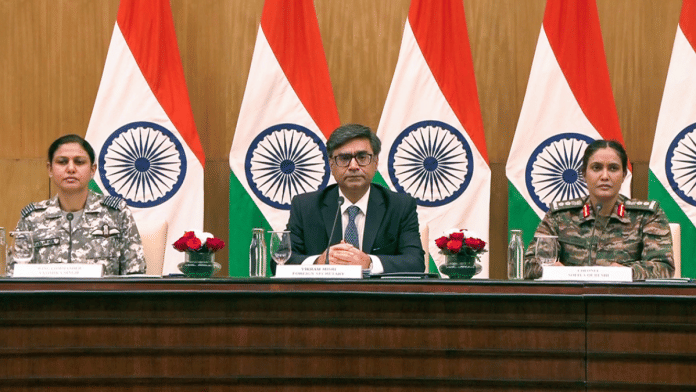New Delhi: Pakistan will be “entirely” responsible for the consequences arising from any attack on Indian infrastructure, Foreign Secretary Vikram Misri warned Thursday as he held a special press briefing on Operation Sindoor amid the spiraling tensions between the two countries.
Misri asserted that for New Delhi the “escalation” began with the 22 April terrorist attack in Kashmir’s Pahalgam which left 25 Indians and one foreign national dead, and that India’s response—Operation Sindoor—was “restrained” and directed towards terrorist camps.
“One point that I wanted to also address was the allegations of the targeting of a dam, the Neelam-Jhelum project in Pakistan-occupied Kashmir (PoK). I want to say that this is an absolute and complete fabrication and a blatant lie…I should note that if this kind of claim is a pretext for targeting Indian infrastructure of a similar nature, Pakistan will be entirely responsible for the consequences that will undoubtedly follow,” said the foreign secretary.
Misri’s stern comments come in the wake of what India believes is a wave of disinformation emanating from Pakistan. Since the Pahalgam terrorist attack, Islamabad has made a plethora of claims including that Pakistan has nothing to do with the Pahalgam massacre and that Operation Sindoor targets civilians.
“Our intention has not been to escalate matters. We are only responding to the original escalations, as I said. And our response has been targeted, precise, controlled and measured. No military targets have been selected. Only terrorist infrastructure in Pakistan has been hit,” said Misri, mirroring the brief he gave the envoys from the member-states of the United Nations Security Council Wednesday, as reported by ThePrint.
Furthermore, Misri pointed out that Islamabad is the “epicentre” on global terrorism and “has also for decades pursued cross-border terrorism into India with impunity, and as I said yesterday also, in order to deliberately mislead the international community”.
In the early hours of Wednesday India launched Operation Sindoor which targeted nine terrorist complexes across Pakistan and PoK. Since the strikes, Islamabad has increased the intensity of cross-border shelling, while also attempting to target at least 15 Indian towns and cities using drones and missiles early Thursday, according to the Ministry of Defence.
India retaliated with the “same intensity” neutralising one air defence system in Lahore on Thursday. “Any further action by Pakistan, some of which we are seeing today is nothing but escalation by Pakistan now, once again, and will be responded to and is being responded to appropriately,” explained Misri on the Indian operations early Thursday.
Pakistan’s support of TRF
To highlight Islamabad focussing to protect terrorists on its soil, Misri pointed out that The Resistance Front (TRF)—the group which is a front for the proscribed outfit Lashkar-e-Taiba—twice claimed responsibility for the terrorist attacks in Pahalgam.
“What is interesting is that when a meeting was being held in the UN Security Council regarding the attack in Pahalgam, then you can imagine which country opposed the mention of the TRF, the Resistance Front in that,” pointed out Misri.
The Indian Foreign Secretary added that “it is perhaps only after the full gravity of the incident was realised by its masters and handlers across the border that it [TRF] managed to back off from this claim.”
Misri went on to add that Pakistan is home to a number of internationally proscribed organisations and terrorists, and that India will soon be meeting with 1267 Sanctions Committee of the UN with updated information on the TRF.
On Pak’s invitation for ‘impartial investigation’
The Pakistani government has repeatedly raised its willingness to jointly investigate the Pahalgam attacks. It has received support from some foreign capitals including Ankara and Baku for its calls on such an investigation. However, India has in the past invited Pakistan to join investigations into terrorist attacks including after the 2008 Mumbai attack and the 2016 Pathankot attack. But it has rejected any such attempt after Pahalgam, in what seems to be a case of once bitten, twice shy.
“We, in particular with regard to the Mumbai attacks of 2008, where a Pakistani Lashkar-e-Taiba terrorist was captured alive; India provided extensive information and evidence related to the involvement of Pakistani terrorists in this attack,” explained Misri.
“Cases were registered, but you are all aware that these cases have not progressed despite the formation of judicial teams etc., and Pakistan has consistently stonewalled all efforts to move the investigation along.”
In the case of Pathankot in 2016, India gave the Pakistani investigators “unprecedented access” to the site of the attack and shared details of call records, DNA samples and presented evidence against the office bearers of the Jaish-e-Mohammed. However, there has been no movement in this case, pointed out Misri.
“So, in all of this, I think the experience has not been positive, and it certainly doesn’t give us the confidence now to take at face value, Pakistani assertions of wishing to participate in a joint investigation. These are just delaying tactics. These are just stonewalling tactics,” said Misri.
(Edited by Ajeet Tiwari)






